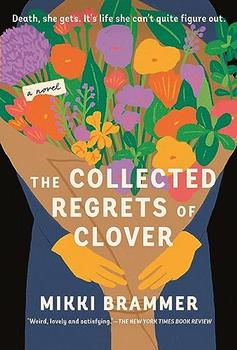Book Club Discussion Questions
In a book club? Subscribe to our Book Club Newsletter and get our best book club books of 2025!
For supplemental discussion material see our Beyond the Book article, The Death Doula Profession and our BookBrowse Review of The Collected Regrets of Clover.
Please be aware that this discussion guide will contain spoilers!
-
How does the first chapter set the tone for the rest of the novel? What role do you think Clover's early exposure to death plays in her ability to feel comfortable talking about it?
-
Clover believes that one of the reasons she has had trouble forging connections with others is because of her job as a death doula. Why do you think it's socially unacceptable to discuss death as an inevitable experience we will all face? How is Western society different from others in this sense?
-
Does the colloquial discussion of death and people dying in this novel make you uncomfortable? How about when you read the casual descriptions of the various ways people die on page 48? Do you feel (even just a little) more comfortable with death after reading this novel?
-
Sylvie is the first real friend her own age that Clover has as an adult. What does their friendship teach Clover about vulnerability? Discuss Clover's evolution when it comes to opening herself up to human connection.
-
What effect do you think traveling and learning about various cultures' perception of death has on Clover?
-
After a series of events, Clover begins to see her grandfather as a multifaceted man, rather than just her caregiver. Is there someone in your life you've had this experience with? Is it common for people to view the elderly in a two-dimensional way in Western society? If so, why do you think that is?
-
"'But the thing is, we all know we're going to die—that's guaranteed. So shouldn't we be making the most of our lives anyway?'" How did your perspective on time and the way you lead your life shift, if at all, after reading this novel?
-
Books and movies are a viable way for Clover to escape and gain new perspectives. Did you learn anything new/valuable from experiencing the world through Clover's lens? How often do you inhabit your imagination, as Clover does?
-
"Someone told me once that [grief is] like a bag that you always carry—it starts out as a large suitcase, and as the years go by, it might reduce to the size of a purse, but you carry it forever...it helped me realize that I didn't need to
ever get over it completely" (page 254). How does it feel to consider grief as something you learn to deal with, rather than setting an end goal of ridding yourself of it? Has your perception of grief shifted at all after reading this novel?
-
When Sebastian's paternal grandfather died, his father "didn't even cry at the funeral" (page 227). Clover considered this "a typical male response to grief" (page 227). How does this example of handling grief "like a man" affect Sebastian's relationship with death and the way he navigates his life?
-
Sebastian mentions feeling "that Sunday school guilt," worrying if he was "doing all the right things to get into heaven" (page 226). How has your upbringing, spirituality, or religion influenced the way you think about death?
-
Clover compulsively rewatches romantic scenes in movies as a type of coping mechanism. What did you make of this behavior? Do you ever find yourself returning to TV shows, movies, or books?
-
"Don't let the best parts of life pass you by because you're too scared of the unknown" (page 283). Consider where you are in your own life. If tomorrow was your last day, which of Clover's three books do you think your final words would belong in?
-
"But the secret to a beautiful death is to live a beautiful life. Putting your heart out there. Letting it get broken. Taking chances. Making mistakes." How important do you think it is to be "cautiously reckless" with your life? How do you plan to do so moving forward, if at all?
-
By the end of the novel, Clover realizes she's spent most of her life operating as the person the world told her she was, rather than who she believed herself to be. How does Clover's character shift after she begins to reevaluate herself?
-
Do you think Clover still needs those vitamins she went out twice to get? Or did she receive them in a different way?
Unless otherwise stated, this discussion guide is reprinted with the permission of St. Martin's Griffin.
Any page references refer to a USA edition of the book, usually the trade paperback version, and may vary in other editions.
